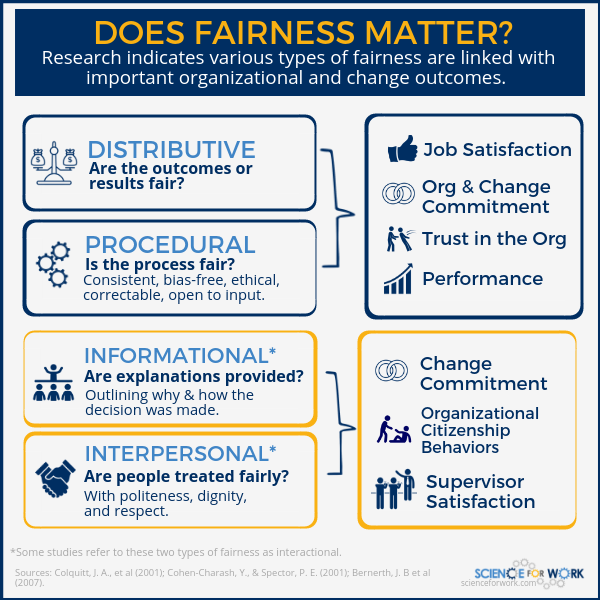I am a big fan of evidence based decision making. And fortunately - there is a group that dedicates itself to answering questions about business management problems by reviewing the literature and publishing an Evidence Summary of what the literature says works.
The website Science for Work recently published an Evidence Summary titled: Why you should consider fairness when designing your change management process see: https://scienceforwork.com/blog/fairness-change-management/
Fairness in the workplace has many different metrics - but it's associated with justice. According to the summary it is indeed beneficial to consider fairness in your decision making. "While the research we reviewed does not support causal conclusions, it does indicate that there is a noticeable relationship between different types of fairness and a variety of organizational outcomes."
Or to put that in plain English, "In addition to moral or ethical reasons for seeking fairness during an organizational change, you may also want to add effectiveness to your argument."
Another key finding is that, "procedural fairness is the strongest predictor of many outcomes, and particularly stands out in relation to work performance." Procedural fairness is whether the decision making process is fair or not.
If you want to help people feel more satisfaction with outcomes, you will want to make sure there is distributive fairness meaning the outcomes of the decision are seen as fair.

The website Science for Work recently published an Evidence Summary titled: Why you should consider fairness when designing your change management process see: https://scienceforwork.com/blog/fairness-change-management/
Fairness in the workplace has many different metrics - but it's associated with justice. According to the summary it is indeed beneficial to consider fairness in your decision making. "While the research we reviewed does not support causal conclusions, it does indicate that there is a noticeable relationship between different types of fairness and a variety of organizational outcomes."
Or to put that in plain English, "In addition to moral or ethical reasons for seeking fairness during an organizational change, you may also want to add effectiveness to your argument."
Another key finding is that, "procedural fairness is the strongest predictor of many outcomes, and particularly stands out in relation to work performance." Procedural fairness is whether the decision making process is fair or not.
If you want to help people feel more satisfaction with outcomes, you will want to make sure there is distributive fairness meaning the outcomes of the decision are seen as fair.

Finally - "when unpopular changes are made, a fair process may help — particularly when explained to those who are impacted."
Fairness is a matter of morality. Don't ignore this when making business decisions. It's why humanistic management is good management.
